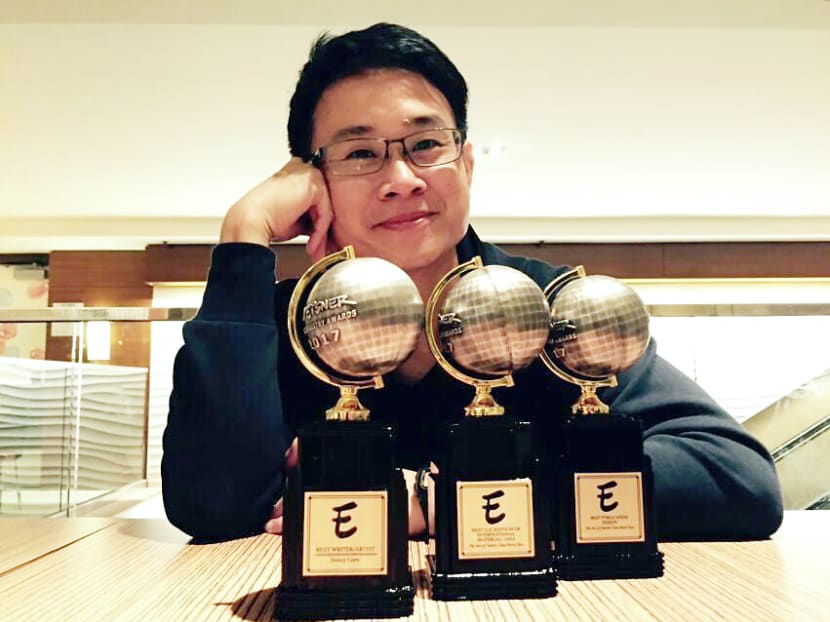NAC draws flak for 'terse' praise of Sonny Liew's Eisner awards
SINGAPORE – The National Arts Council’s (NAC) congratulatory note to local graphic novelist Sonny Liew on his Eisner Award wins has sparked an online furore after it failed to mention the work for which he earned the international accolades.

Sonny Liew picked up three Eisner Awards — the Oscars of the comics industry — for his graphic novel, The Art of Charlie Chan Hock Chye, on Saturday. Photo: Chan Shiuan
SINGAPORE — The National Arts Council’s (NAC) congratulatory note to local graphic novelist Sonny Liew on his Eisner Award wins has sparked an online furore after it failed to mention the work for which he earned the international accolades.
In a Facebook post on Monday, the NAC congratulated Liew for winning three Eisner Awards at the annual Comic Convention International (Comic-Con) in San Diego on Saturday. Without mentioning Liew’s work, the NAC said: “We are pleased that a Singaporean has been accorded international recognition for artistic merit. We look forward to seeing Sonny’s new works, including his upcoming first venture on stage at the NAC-commissioned Singapore International Festival of Arts.”
Liew won the Best Writer/Artist, Best Publication Design and Best US Edition of International Material (Asia) awards for his graphic novel The Art of Charlie Chan Hock Chye.
When contacted, Liew called NAC’s congratulatory message “somewhat terse”, but said “effusive praise would matter less than the willingness of the authorities to engage in dialogue with the arts community about its decisions and processes”.
Netizens called out the NAC for failing to recognise — what some have since dubbed — “the work that must not be named”, saying it is “hypocritical” when support for the work had been withdrawn. The agency withdrew a S$8,000 publishing grant for the graphic novel due to “sensitive content” on the eve of its Singapore launch in 2015.
The work follows the story of fictional artist Charlie Chan during the formative years of Singapore’s history, and features events and personalities such as founding Prime Minister Lee Kuan Yew, opposition politician Lim Chin Siong and Operation Spectrum, the so-called Marxist Conspiracy, in 1987.
Following Liew’s win, the NAC said: “A grant withdrawal is rare, and it was unfortunate that we had to take this course of action when Sonny’s novel was published. Sonny’s work, while of high artistic merit, breached our funding guidelines.”
It noted, however, that “Sonny continues to be supported in various other ways, for example, he enjoys subsidised arts housing in the much sought-after Goodman Arts Centre”.
Liew’s wins have reignited a debate in the arts fraternity about whether funding for the arts should be based purely on artistic merits, without political considerations.
Another local author, Jeremy Tiang, who previously had part of his NAC grant withdrawn, said: “Good art challenges the status quo, interrogates accepted narratives, and speaks truth to power. Unfortunately, these things would be difficult to do while adhering to the NAC’s funding criteria.”
Also weighing in on the discussion was one of Singapore’s popular young novelists, Balli Kaur Jaswal, who questioned if the withdrawal of funding was a knee-jerk reaction.
“The funding cuts are usually prompted by some pre-emptive fears of backlash or criticism, but our readers don’t need to be protected like that,” she said.
Illustrator Dan Wong, famous for his illustrations online on current affairs such as the seizure of the nine Terrex Infantry Carrier Vehicles in Hong Kong, added: “I think that while it’s natural for our government to want to control the historical narrative, being inflexible and closed-minded will stunt the developing cultural and visual identity of Singapore, and make us a poorer society for it.”
Another young poet, Jennifer Anne Champion, was more circumspect. “All artists have to compromise with their patrons. When you see your patron as the government, it’s expected that they’ll want to fund a creation that is beneficial to them. We can’t fault a government for wanting that. But we can be clear on what our positions are. I think there’s also a fear (that) an artist funded by government (is seen) as being a lackey,” she said.
Liew’s own response to the online discussion was measured, saying that while aspects of the system may be “burdensome”, open dialogue and communication is necessary to nurture artists and the arts in Singapore.
He also noted that the NAC is made up of “many disparate individuals, many of whom are trying to do their best” and regardless of individual intentions, dialogue is important.
Liew added: “It would be too easy otherwise to form antagonistic tribes caught up in conflicts no one actually wants to be in, instead of having everyone work together to nurture artists and the arts in Singapore.”









